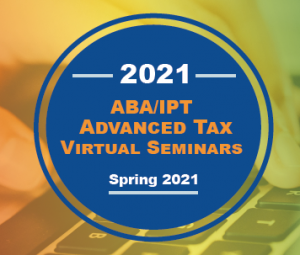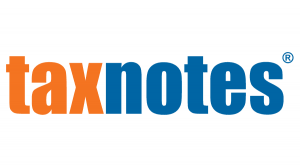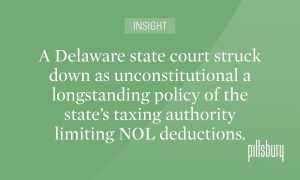Pillsbury SALT attorneys Carley Roberts, Annie Huang and Robert Merten III will present at the COST Central West Regional State Tax Webinar on March 24.

Pillsbury SALT attorneys Carley Roberts, Annie Huang and Robert Merten III will present at the COST Central West Regional State Tax Webinar on March 24.

Pillsbury SALT partner Breann Robowski will present during ABA/IPT’s 2021 Advanced Property Tax Seminar on March 18.

Pillsbury SALT partner Craig Becker will present during COST’s 2021 Sales and Transaction Tax Webinar on February 25. Craig is partnering with Harley Duncan (KPMG), Jordan Goodman (HMB) and Mark Yopp (Baker & McKenzie) to present on the topic, “Wrangling in Local Transaction Taxes.”

The Connecticut House of Representatives is considering multiple proposals that would permit Connecticut residents and part-year residents to take credits for tax paid to other states while working from Connecticut during the pandemic. Connecticut law currently allows credits for tax paid to another state only if: (1) the individual was physically located in such other state while working; or (2) the individual is a resident of a state that applies the “convenience of the employer” sourcing rule. Two bills have been introduced, both of which would expand the allowable credits only for Connecticut residents and part-year residents for the tax year beginning January 1, 2020. H.B. 6183; S.B. 873. Continue Reading ›
for tax paid to other states while working from Connecticut during the pandemic. Connecticut law currently allows credits for tax paid to another state only if: (1) the individual was physically located in such other state while working; or (2) the individual is a resident of a state that applies the “convenience of the employer” sourcing rule. Two bills have been introduced, both of which would expand the allowable credits only for Connecticut residents and part-year residents for the tax year beginning January 1, 2020. H.B. 6183; S.B. 873. Continue Reading ›
Pillsbury SALT attorneys Carley Roberts, Zachary Atkins, Nicole Boutros and Evan Hamme will present during Tax Executive Institute’s Wisconsin Chapter Meeting on February 18. Continue Reading ›
Continue Reading ›
Partner Carley Roberts and counsel Robert Merten III authored Part 1 of a multi-part series in Tax Notes State’s SeeSALT Digest to review the landscape of market-based sourcing rules and provide an in-depth focus on various states’ use of reasonable approximation.

Read more here. Continue Reading ›
In 2018, San Francisco voters approved, by simple majority vote, two new gross receipts taxes: the Homelessness Gross Receipts Tax (SF-HT) and the Commercial Rents Tax (SF-CRT), with both  taxes effective as of January 1, 2019.[1] Because these taxes fund specific governmental services, they are designated as special taxes (specifically, the SF-HT funds homelessness services and the SF-CRT funds early childhood education). Since the California Constitution specifies that special taxes imposed by local government need two-thirds voter approval (i.e., a “supermajority”), taxpayer groups have filed lawsuits to invalidate these special taxes, as both were approved by only a majority vote (61% for the SF-HT and 51% for the SF-CRT).[2] As discussed more fully below, the courts have ruled against these taxpayer groups and the California Supreme Court to date has refused review.
taxes effective as of January 1, 2019.[1] Because these taxes fund specific governmental services, they are designated as special taxes (specifically, the SF-HT funds homelessness services and the SF-CRT funds early childhood education). Since the California Constitution specifies that special taxes imposed by local government need two-thirds voter approval (i.e., a “supermajority”), taxpayer groups have filed lawsuits to invalidate these special taxes, as both were approved by only a majority vote (61% for the SF-HT and 51% for the SF-CRT).[2] As discussed more fully below, the courts have ruled against these taxpayer groups and the California Supreme Court to date has refused review.
The pressing question is whether San Francisco taxpayers, who paid the SF-HT and/or the SF‑CRT for 2019 and 2020, should be filing claims to protect their rights to refunds in the unlikely (but not impossible) event that these taxes are ultimately rendered invalid.
A Delaware state court invalidated the Delaware Division of Revenue’s policy limiting net operating loss (NOL) deductions  for members of federal consolidated groups, holding that the policy violated the Uniformity Clause of the state constitution. Verisign, Inc. v. Director of Revenue, No. N19C-08-093 JRJ (Del. Super. Ct. Dec. 17, 2020). The decision presents a potential refund opportunity for Delaware corporate taxpayers who were members of a federal consolidated group, and for Delaware corporate income tax purposes had their separate-company NOL deductions limited to the group’s consolidated NOL.
for members of federal consolidated groups, holding that the policy violated the Uniformity Clause of the state constitution. Verisign, Inc. v. Director of Revenue, No. N19C-08-093 JRJ (Del. Super. Ct. Dec. 17, 2020). The decision presents a potential refund opportunity for Delaware corporate taxpayers who were members of a federal consolidated group, and for Delaware corporate income tax purposes had their separate-company NOL deductions limited to the group’s consolidated NOL.
Pillsbury attorney Zack Atkins explains.
To read the full article, please click here.
Pillsbury SALT partners Craig Becker and Breann Robowski will present during Pillsbury’s 2021 California CLE Marathons. This event features a wide variety of live webinars on timely topics. Craig and Breann will present “California Property, Transfer and Local Tax Updates” on Monday, January 25. Continue Reading ›
Continue Reading ›
Pillsbury SALT partner Breann Robowski will present during The National Multistate Tax Symposium. The theme for the 2021 symposium is “Leading Through Uncertainty – Navigating Multistate Tax With Confidence,” which will focus on exploring significant issues facing today’s multistate tax practitioners.